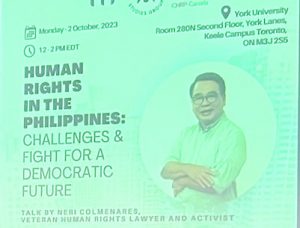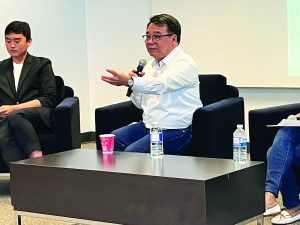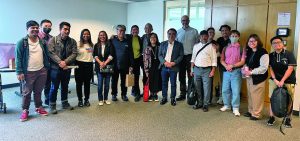Neri Colmenares forum at York U
Neri Colmenares forum at York U

The poster of the event.
On human rights, social justice, ICC
By Lui Queaño
The Philippine Reporter
Neri Colmenares’s speech at a student and academic forum at York University on October 2, eloquently addressed the issues raised by York University students on the state of Philippine democracy.
The Philippine Studies Group (PSG) at York University organized the event featuring Neri Colmenares. PSG is composed of faculty members, including community members with shared beliefs regarding the necessity of a Philippine Studies program.

Jojo Quintero and Colmenares.
York University in Canada has the largest contingent of faculty members engaged in research in Philippine-related studies.
Ethel Tungohan , Associate Professor of Politics at York University and member of the Philippine Studies Group said that the hosting of Neri Colmenares event at York is made possible through the financial support provided by various organizations, including the York Centre for Asian Research, the Philippine Consulate of Toronto, the Social Sciences and Humanities Research Council, and other entities.
During her opening remarks, Tungohan expressed gratitude to the Jack & Mae Nathanson Centre on Transnational Human Rights, Crime and Security, the York Centre for Asian Research, the Philippine Studies Group (PSG), the Migrants Resource Centre, Malaya Canada, and ICHRP-Canada for their support in ensuring the successful realization of the event.
PhD candidate Jojo Quintero and recent Magna Cum Laude graduate Leny Rose Simbre, both students from York University and community organizers, moderated the discussion with Neri Colmenares and the audience. The event attracted a diverse audience consisting of students, members of the academic community, and community leaders.

Part of the audience, organizers, students and faculty of York U.
On Martial law and student activism
When asked about NC’s earliest memory of student activism, Neri Colmenares said it was during martial law when he was in primary school. In his recollection, he stated that young people were not permitted to wear long hair, prompting Colmenares to question the authority of the state in forbidding people from wearing their hair long. But it was mostly through his membership in Students Catholic Action that he became even more critical of how the government controls people’s freedom during martial law.
Colmenares said that all student organizations, including student councils, were banned, limiting social interactions among students. The Marcos Sr. government also forbade student newspapers because it feared criticism of its policies. Neri recalled that he was among a large number of students who were arrested, detained, and tortured.
Neri fought back instead of giving in, despite the torture he suffered in detention. Neri and his contemporaries emerged from martial law stronger and more determined because they believed they had not broken the law. They always believed they were not committing a crime because they asked fooor reasonable demands. These demands were simply for student self-organization, which has kept them strong and determined to fight a repressive government.
Colmenares believed that if he could one day become a lawyer, he could restore hope to those who had lost it due to injustice and a repressive government. Support from the international community helped him and other political prisoners tremendously while they were incarcerated. Colmenares and his fellow political detainees would receive a simple Christmas cards from abroad. Colmenares recalled receiving one from a 70-year-old Toronto resident in the 1970s.
On prosecuting Duterte
as human rights lawyer
The main reason for a case being filed against Duterte before the International Criminal Court is a lack of accountability. There were many human rights victims who cried out for justice, including mothers who lost sons, fathers who lost daughters, brothers/sisters who were killed, and even young children who were slain as a result of Duterte’s drug war.
Colmenares, being a human rights lawyer, was part of the group that submitted a petition to the International Criminal Court (ICC) for Duterte’s prosecution. Given the provision of presidential immunity from prosecution under Philippine law, filing the case before the ICC can be considered as the most prudent decision. Nevertheless, Colmenares argues that the justice system’s apparent reluctance in the Philippines serves as an additional obstacle that hindered the prosecution of Duterte.
According to Colmenares, a critical flaw in Duterte’s war on drugs lies in the government’s focus on targeting the victims or users of drugs, rather than directing its efforts towards apprehending those responsible for the supply of drugs to these individuals. To date, the government has primarily focused on apprehending drug users, while imposing minimal or no penalties on those involved in drug supply.
On good governance, historical distortion and democracy under Marcos Jr
“Good governance is a concept we haven’t seen in a very long time,” Colmenares said when asked about its significance in Philippine democracy. Colmenares even lectured the students on the many factors of good governance, of which he cited only four, namely, transparency, consultative,participatory and accountability.
Sadly, according to Colmenares, none of these can be found in the Philippines, not even under the current regime of Marcos Jr. or whoever rules from Malacanang Palace. Colmenares even refers to it as “an illusory dream.” While none of these four elements are present, the current regime of Marcos Jr. is even more authoritarian than that of his father, he said.
Colmenares recalls that even during the time of Duterte, for instance, dissent was not tolerated and that only Duterte could attack anyone, but that Duterte becomes enraged when his government is attacked or criticized. This demonstrates that only one individual’s viewpoint is permitted to govern the entire nation. Sadly, Colmenares acknowledges that this has been the way the Philippine government has functioned for decades.
“The worst aspect of Philippine democracy is that dynasty system rule is so prevalent in Philippine politics. The responsibility to the electorate is lost and irrelevant,” Colmenares said.
The Marcoses believed they had won not due to the support of the electorate, but due to their family names being Marcos or Duterte. This is how democracy functions in a country like the Philippines, where dynasty system rule continues to dominate the political arena.
In conjunction with the implementation of a dynasty system in politics, the ruling family employs disinformation and historical distortion as means to perpetuate their rule over all facets of society. Colmenares noted that during electoral periods, the topic of martial law is often portrayed as a period of prosperity in Philippine society.
On Redtagging
When asked about the role of youth activism against redtagging and other political issues facing the Philippines, Colmenares stated, “I’m sorry that I must place such a heavy burden on you because you play such an important role in the social reform movement.”
In discussing the attributes of the youth and students, namely their open-mindedness, analytical thinking, and ability to articulate their thoughts, Colmenares commended these qualities for their potential application in analyzing the present situation in the Philippines. This includes topics such as the Maharlika funds, confidential funds, and the Chinese incursion in the West Philippine Sea. The point, according to Colmenares, is that today’s students can bring these pressing issues to the attention of the community and discuss them in terms that are easily understood.
With the inspiring words of wisdom Colmenares said that “the desire to be a part of the social reform movement is always present in the young, because it is their future that is at stake.”
During the forum, Malaya Canada, Migrante Canada, and ICHRP-Canada delivered their messages, urging the academic community and students to actively contribute their voices towards promoting social change. They emphasized the significance of addressing issues related to migrants’ rights, human rights, and the pursuit of genuine democracy, particularly within the context of the Filipino struggles for national liberation
The student forum at York University, titled “Human Rights in the Philippines: Challenges and Fight for Democratic Future” featuring Neri Colmenares, provided an opportunity for the academic community to engage in the exploration and discussion of various concerns and issues related to the Filipino diaspora. Providing a platform for students to express their perspectives on the current state of Philippine democracy is a valuable opportunity that reinforces the notion, as articulated by Neri Colmenares in his address, that there is optimism for the Philippines and for the Filipino people. This is particularly evident when young students actively participate and assume responsibility for their contribution to social change.
Comments (0)